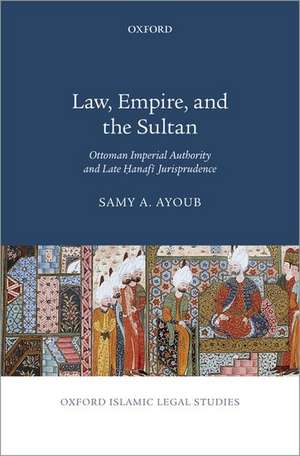Law, Empire, and the Sultan: Ottoman Imperial Authority and Late Hanafi Jurisprudence: Oxford Islamic Legal Studies
Autor Samy A. Ayouben Limba Engleză Hardback – 31 ian 2020
Preț: 641.87 lei
Preț vechi: 858.34 lei
-25% Nou
Puncte Express: 963
Preț estimativ în valută:
122.86€ • 133.50$ • 103.27£
122.86€ • 133.50$ • 103.27£
Carte tipărită la comandă
Livrare economică 09-15 aprilie
Preluare comenzi: 021 569.72.76
Specificații
ISBN-13: 9780190092924
ISBN-10: 0190092920
Pagini: 216
Dimensiuni: 236 x 157 x 23 mm
Greutate: 0.5 kg
Editura: Oxford University Press
Colecția OUP USA
Seria Oxford Islamic Legal Studies
Locul publicării:New York, United States
ISBN-10: 0190092920
Pagini: 216
Dimensiuni: 236 x 157 x 23 mm
Greutate: 0.5 kg
Editura: Oxford University Press
Colecția OUP USA
Seria Oxford Islamic Legal Studies
Locul publicării:New York, United States
Recenzii
The book brilliantly illustrates the transformation of the relationship between Ḥanafi legal scholars and the state as well as the rulers' influence on the law and the legal discourse ... A striking feature of Ayoub's book is his skilled and convincing use of the primary sources of Ḥanafi scholars ... Ayoub's book is an extremely precious contribution to the literature.
Ayoub's meticulous study casts a much-needed light on the creativity and innovation of the late Hanafi tradition. By focusing on the tradition from within, Law, Empire, and the Sultan makes a significant contribution to the scholarly debate on the nature of the Islamic legal order in general and in recent centuries in particular.
Professor Samy Ayoub's Law, Empire, and the Sultan challenges the view that Muslim jurists operated outside of political authority by showing how Ottoman Hanafi scholars from the sixteenth to nineteenth centuries endorsed the Sultan's role in lawmaking. This rich account of late Hanafi jurisprudence should appeal to those with interests in Islamic law, Ottoman history, and processes of legal change.
Samy Ayoub's book is an important contribution to the growing field of Ottoman legal studies. Using the writings of what he calls 'late Hanafis', Ayoub demonstrates that the Ottoman sultan played an active role in shaping the empires legal system. This distinctive tradition of legal thinking was the basis from which nineteenth century legal reform and codification began. This book is a required reading for anyone interested in Islamic legal history, Ottoman history, and the origins of legal modernity in the Middle East.
In Law, Empire, and the Sultan, Samy Ayoub offers a fresh perspective on two of the most widely debated issues in Islamic legal history: the relationship between fiqh as a 'jurists' law and the authority of temporal rulers, and the process of codification. The study adds substance to the growing recognition that the rise of the nation state did not represent a sudden rupture in the development of Islamic legal discourses, but was preceded by significant developments in scholarly attitudes toward the legal authority of rulers. Rather than focusing on the agency of the Ottoman state, Ayoub offers a perspective from within the intellectual and religious world of Ottoman legal scholars.
Professor Ayoub's Law, Empire, and the Sultan is an important contribution to the study of late Hanafism in the Ottoman Empire, and a very welcome complication of clichéd claims that Islamic Law was purely a jurists law. This book is both an important contribution in Islamic legal history and to our understanding of the role of the state in the jurisprudence of Islamic law.
Ayoub's meticulous study casts a much-needed light on the creativity and innovation of the late Hanafi tradition. By focusing on the tradition from within, Law, Empire, and the Sultan makes a significant contribution to the scholarly debate on the nature of the Islamic legal order in general and in recent centuries in particular.
Professor Samy Ayoub's Law, Empire, and the Sultan challenges the view that Muslim jurists operated outside of political authority by showing how Ottoman Hanafi scholars from the sixteenth to nineteenth centuries endorsed the Sultan's role in lawmaking. This rich account of late Hanafi jurisprudence should appeal to those with interests in Islamic law, Ottoman history, and processes of legal change.
Samy Ayoub's book is an important contribution to the growing field of Ottoman legal studies. Using the writings of what he calls 'late Hanafis', Ayoub demonstrates that the Ottoman sultan played an active role in shaping the empires legal system. This distinctive tradition of legal thinking was the basis from which nineteenth century legal reform and codification began. This book is a required reading for anyone interested in Islamic legal history, Ottoman history, and the origins of legal modernity in the Middle East.
In Law, Empire, and the Sultan, Samy Ayoub offers a fresh perspective on two of the most widely debated issues in Islamic legal history: the relationship between fiqh as a 'jurists' law and the authority of temporal rulers, and the process of codification. The study adds substance to the growing recognition that the rise of the nation state did not represent a sudden rupture in the development of Islamic legal discourses, but was preceded by significant developments in scholarly attitudes toward the legal authority of rulers. Rather than focusing on the agency of the Ottoman state, Ayoub offers a perspective from within the intellectual and religious world of Ottoman legal scholars.
Professor Ayoub's Law, Empire, and the Sultan is an important contribution to the study of late Hanafism in the Ottoman Empire, and a very welcome complication of clichéd claims that Islamic Law was purely a jurists law. This book is both an important contribution in Islamic legal history and to our understanding of the role of the state in the jurisprudence of Islamic law.
Notă biografică
Samy A. Ayoub is an Assistant Professor of Law and Middle Eastern Studies at the University of Texas at Austin.









